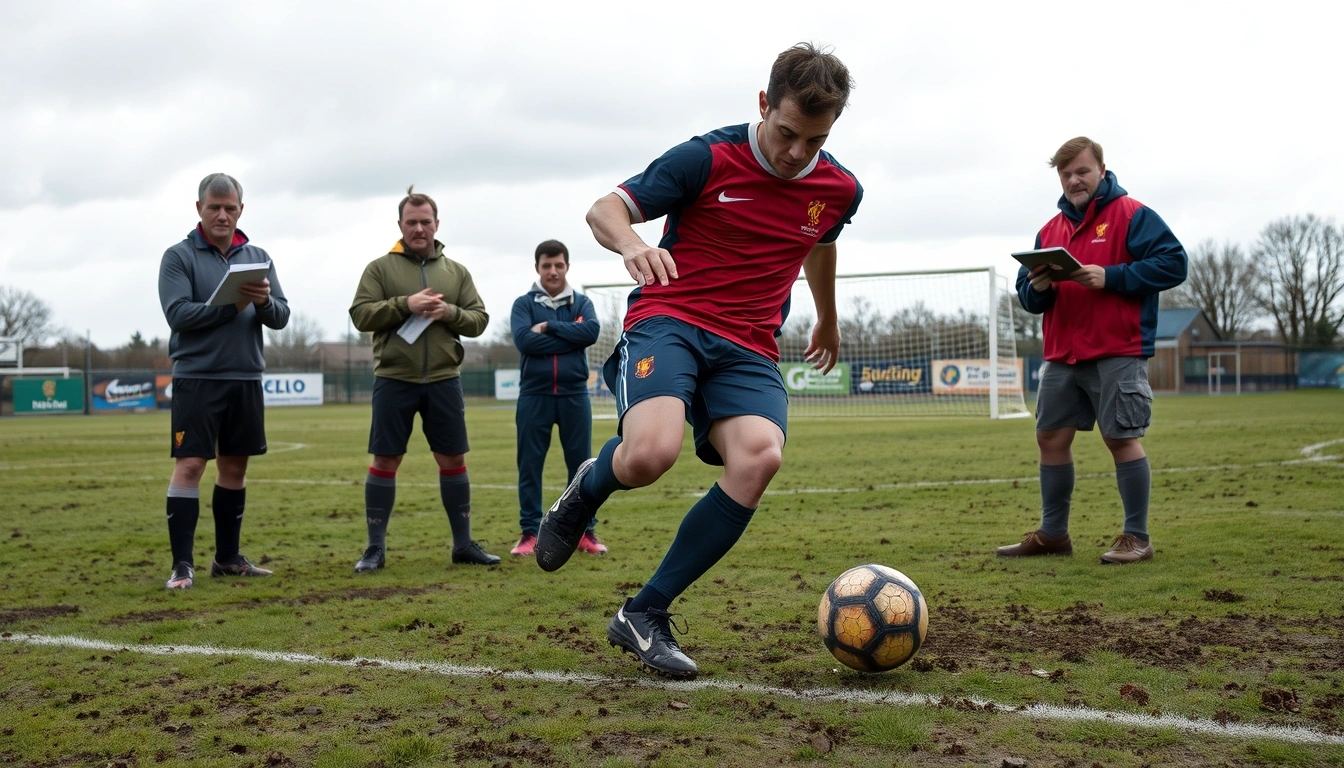Alright, so you’re dreaming of making it in football, but not quite ready for the glitz and glam of the Premier League just yet? Welcome to the wild, unpredictable, and sometimes downright frustrating world of non-league football scouting in the UK. It’s a jungle out there, but if you’ve got a bit of grit, some clever moves, and a sprinkle of luck, you can catch the eye of those elusive scouts lurking in the shadows of Saturday league games.
First off, let’s get one thing straight: non-league scouts aren’t your typical talent-spotters with fancy tech and endless budgets. Nope, they’re more like hawks with sharp eyes, relying on good old-fashioned eyeballing and word of mouth. They’re looking for raw potential, attitude, and players who can make a difference without costing a fortune. Forget about being flashy; consistency and hustle are your best mates here.
- Tip #1: Show up early and stay late at local matches. Scouts often hang around after games chatting with coaches and players. Being visible off the pitch counts.
- Tip #2: Build a football CV that’s more than just stats. Think work rate, versatility, and how you handle pressure. These are the secret ingredients scouts drool over.
- Tip #3: Don’t be shy about networking. Sometimes the guy cleaning the lockers knows exactly who’s looking for a left-back or a gritty midfielder.
| What Scouts Look For | Why It Matters |
|---|---|
| Physical Fitness | Non-league football is tough; stamina separates the good from the great. |
| Mental Toughness | Handling rejection, pressure, and the grind is half the battle. |
| Teamwork & Attitude | Clubs want players who lift the squad, not just score goals. |
| Technical Skills | Obviously important but not the be-all and end-all here. |
Now, let’s talk about open trials, the stuff of legends and nightmares. They can be chaotic, with dozens of hopefuls crammed into a muddy pitch, all trying to impress in a matter of minutes. Expect everything from clueless coaches to bizarre drills that make you question your life choices. But hey, surviving this circus shows you’ve got what it takes.
And don’t underestimate the power of social media. A well-crafted highlight reel on YouTube or Instagram might just get you noticed by a scout scrolling through endless clips. Just avoid looking desperate – nobody likes that.
Practical Checklist:- Keep your kit clean and ready.- Train hard, play harder.- Attend local matches religiously.- Network like your future depends on it (because it kinda does).- Be patient and keep your chin up after rejection.- Use social media smartly.
In the end, getting scouted in non-league football is as much about heart and hustle as it is about talent. It’s a rollercoaster ride filled with ups, downs, and the occasional curveball. But for those who stick around, the rewards can be massive. So lace up, get out there, and show them what you’re made of.
Understanding the Non-League Football Landscape
Alright, so you’ve probably heard the term “non-league football” thrown around like a hot potato, but what does it actually mean in the UK? Put simply, non-league football refers to all the tiers of English football that sit below the professional Football League (EFL). That means anything outside the top four divisions: Premier League, Championship, League One, and League Two. Sounds straightforward, right? But the reality is a bit messier—and way more exciting for players who are hungry to make their mark.
Non-league football is like the wild west of the football world. It’s a sprawling network of semi-professional and amateur clubs scattered across the country, from gritty urban grounds to picturesque village pitches. The level of play varies wildly, but one thing’s for sure—there’s passion oozing from every corner. For many players, it’s the launchpad to bigger things, or simply a chance to keep the dream alive when the professional route feels like a distant mirage.
| League Level | Typical Club Status | Player Profile |
|---|---|---|
| National League (5th tier) | Mostly semi-pro, some full-time | Former pros, young prospects, journeymen |
| Regional Premier Divisions (6th tier) | Semi-pro | Local talents, part-timers balancing work |
| Lower Regional Leagues (7th tier and below) | Amateur to semi-pro | Weekend warriors, late bloomers |
Now, why is non-league such a goldmine for hungry players? Well, for starters, it’s a massive talent pool that’s often overlooked by the big clubs. Scouts from the Premier League or Championship aren’t exactly camping out at every Sunday league match, but non-league scouts? They’re on the lookout for diamonds in the rough—players who might have been missed by the system or are late developers. It’s a place where grit, determination, and raw ability can sometimes outshine polished skill.
- Opportunity to play regularly: Unlike academy setups where competition is fierce, non-league clubs often give players a chance to get consistent minutes on the pitch.
- Less pressure, more freedom: Without the media circus and sky-high expectations, players can focus on developing their game.
- Community vibe: Clubs are often deeply rooted in their local areas, creating a tight-knit environment that can boost morale and motivation.
But don’t get it twisted—non-league football isn’t a walk in the park. Facilities can be basic, the pitches muddy, and the travel a pain. Plus, many players juggle day jobs or studies alongside football, making commitment a juggling act worthy of a circus performer. Still, that’s part of the charm. It’s football stripped back to its raw essentials.
A quick glance at the pyramid:- Premier League (1st tier)- EFL Championship (2nd tier)- League One (3rd tier)- League Two (4th tier)- National League (5th tier - non-league starts here)- Regional Leagues (6th tier and below)
So, if you’re the type who’s got a chip on your shoulder, a fire in your belly, and a dream to climb the ladder, non-league football is your playground. It’s unpredictable, challenging, and sometimes downright frustrating—but boy, when you get it right, it’s oh-so-rewarding. And remember, many stars you see lighting up the Premier League started their journey right here, battling it out in the mud and rain of non-league pitches.
In a nutshell, non-league football is the heartbeat of grassroots football in the UK, a testing ground for talent, character, and sheer love of the game. If you want to get noticed, you’ve got to understand this world, embrace its quirks, and be ready to fight for every inch on the pitch.
Why Non-League Clubs Scout Differently
Alright, let’s get real for a second. When you think about scouting in football, your mind probably jumps straight to those slick Premier League setups — the fancy tech, drones, GPS trackers, and data analysts crunching numbers like it’s rocket science. But here’s the kicker: non-league clubs play by a totally different rulebook. It’s less about gadgets and more about good old-fashioned eyeballs and grit. No, seriously. It’s like comparing a Tesla to a battered old van that somehow still gets the job done.
| Aspect | Premier League / Championship | Non-League Clubs |
|---|---|---|
| Use of Technology | High-tech video analysis, GPS tracking, AI-driven stats | Minimal tech; mostly live observation and word-of-mouth |
| Scout Resources | Dedicated full-time scouts, analysts, and data teams | Part-time scouts, volunteers, or even coaches doubling up |
| Player Pool | Global reach, international scouting networks | Local and regional focus, often relying on community ties |
| Scouting Approach | Data-driven, statistical, video highlights | Live matches, training sessions, personal recommendations |
Now, why is this the case? Well, non-league clubs usually operate on shoestring budgets. They don’t have the luxury to splash out on expensive tech or maintain a whole army of scouts jetting off to far-flung countries. Instead, their scouts are often local legends — people who know the grassroots scene inside out. They’re out there on muddy pitches, rain or shine, watching Saturday league games, chatting with coaches, and sometimes even just catching a player’s hustle in the local pub!
This “boots on the ground” approach means non-league scouting is way more personal and, frankly, a bit chaotic. There’s no fancy spreadsheet telling them a player’s expected goals per 90 minutes. Instead, it’s about spotting raw potential, attitude, and that intangible “something” that stats can’t measure. A scout might see a player who’s not the flashiest but works their socks off, reads the game well, or just has that never-say-die spirit.
- Tip for players: Don’t just focus on flashy skills. Show your work ethic and attitude — scouts notice that.
- Tip for clubs: Keep those ears open — word-of-mouth is gold in non-league football.
And let’s not forget, non-league scouting is sometimes a bit of a luck game. A scout might just happen to be at the right game on the right day and spot a diamond in the rough. Or, more often than not, a player’s reputation grows through local chatter and recommendations rather than highlight reels on YouTube.
“Tech? Nah, we trust our eyes and gut feel. If a lad’s putting in 110% every match, that’s what counts.” – Typical non-league scout, probably.
So, if you’re dreaming of getting noticed by a non-league club, remember: it’s not about having the flashiest Instagram highlight video or the latest wearable tech. It’s about being there, playing consistently, showing heart, and making sure the right people see you in action.
In the end, non-league scouting is a bit like fishing with a homemade rod — it might not be fancy, but with patience and persistence, you’re bound to catch something worthwhile.

Building Your Football CV: What Scouts Really Look For
Alright, so you’ve been banging in goals and dishing out assists like a pro in your local league, but here’s the kicker — non-league scouts aren’t just glued to your stats sheet. Nope, they’re hunting for something a bit more elusive, the kind of qualities that don’t always show up in cold, hard numbers.
- Work Rate and Attitude: Forget about being the flashiest player on the pitch. Scouts want to see a player who never gives up, chases down every ball, and hustles like their life depends on it. You know, that annoying pest who just won’t let the opposition breathe. It’s the kind of grit that can turn a good player into a great asset for the team.
- Football IQ: This isn’t just about fancy tricks or nutmegs. It’s about reading the game, making smart decisions under pressure, and knowing when to hold your horses or launch a counter-attack. Scouts love players who can think two steps ahead, even if they’re not the fastest or strongest.
- Versatility: Can you slot into multiple positions without throwing a tantrum? Non-league clubs often have smaller squads, so a player who can adapt and fill gaps is pure gold. If you’re a midfielder who can also cover at full-back or a striker who’s happy to drop deep, that’s a massive tick in your box.
Look, it’s not just about what you do on the pitch either. Scouts are also checking out your professionalism off it. Showing up on time, looking after your body, and being coachable — yeah, that stuff matters.
| Key Quality | What Scouts Look For | Why It Matters |
|---|---|---|
| Physical Fitness | Stamina, strength, injury resilience | Non-league football is a grind. If you fade after 60 minutes, you’re not helping anyone. |
| Mental Toughness | Handling pressure, bouncing back from mistakes | Games aren’t always pretty; scouts want players who keep their heads when the going gets tough. |
| Teamwork | Communication, support play, selflessness | One-man shows rarely win leagues. Scouts want players who lift the whole team. |
Now, here’s a little insider nugget: non-league scouts often rely on word-of-mouth and recommendations from trusted coaches or players. So, it’s not just about your highlight reel on YouTube — it’s about building a rep that precedes you.
Practical Tips to Boost Your Football CV:- Show up early and stay late at training.- Be open to feedback, even if it stings.- Keep a simple video diary of matches focusing on your decision-making.- Network with local coaches and players; they’re your best advocates.- Stay consistent—one good game won’t cut it.
In short, if you want to get noticed, don’t just chase the glory stats. Work on your hidden qualities — the stuff that makes coaches trust you to put on the shirt week in, week out. Because at the end of the day, non-league football is a tough, scrappy business, and scouts want players who can survive and thrive in that chaos.
So, lace up, get stuck in, and remember: sometimes the quiet grind off the ball speaks louder than the goals on it.
Showcasing Your Skills in Local Matches
Alright, so you’re out there every Saturday, lacing up your boots, hoping to catch the eye of some scout lurking around the sidelines. But let’s be honest — you’re not exactly the flashy winger who’s pulling off stepovers like Messi or banging in screamers from 30 yards. No worries. Scouts don’t always want the next Cristiano Ronaldo; sometimes, they want the gritty, reliable player who gets the job done week in, week out. So how do you turn your local league game into a personal highlight reel that scouts can’t ignore?
First off, consistency is king. You don’t need to dazzle with fancy footwork every minute, but showing up and delivering solid performances is what builds trust. Scouts notice players who maintain focus, make smart decisions, and don’t crumble under pressure. Think of it like this: you’re not auditioning for a circus act, you’re proving you can be the backbone of a team.
| Key Traits Scouts Look For | Why It Matters |
|---|---|
| Positioning & Awareness | Being in the right place at the right time shows game intelligence. |
| Work Rate | Relentless effort can win matches and impress scouts more than flashiness. |
| Decision Making | Choosing when to pass, shoot, or hold the ball separates pros from amateurs. |
| Physicality & Toughness | Non-league football is gritty; showing resilience counts big time. |
Now, here’s a cheeky little secret: scouts love a player who can do the dirty work. Making crucial tackles, winning aerial duels, or even hustling back on defense can stick in a scout’s mind way more than a flashy nutmeg that goes nowhere. So if you’re not the flashy type, lean into your strengths — be the player who never gives up, who’s always available for a pass, who keeps the team ticking.
- Communicate. A vocal player who organises the team and keeps spirits up is invaluable.
- Stay disciplined. Avoid silly fouls or bookings — scouts note temperament too.
- Train smart. Work on your weaknesses quietly; scouts respect growth.
And don’t forget about making your moments count. Even if you don’t score or assist every week, a perfectly timed interception, a clever through ball, or a last-ditch clearance can be the highlight that gets replayed in a scout’s head. It’s about impact, not just stats.
Practical Tips for Match Day:- Arrive early to warm up and mentally prepare.- Choose your moments to shine; don’t force things.- Keep your kit clean and presentable — yes, scouts notice professionalism.- Ask your coach for feedback and act on it.- Get someone to record your game; footage speaks louder than words.
Finally, remember that scouts are human too — they’re often juggling watching multiple players, weather conditions, and their own biases. So sometimes, you might feel like you did everything right and still get overlooked. Don’t sweat it. Keep showing up, keep grinding, and eventually, your dedication will pay off.
In the chaotic world of non-league football, it’s the grit, heart, and smarts that get you noticed, not just the fancy tricks. So lace up, get stuck in, and make every Saturday count — your personal highlight reel is waiting to be made.
Networking: The Unseen Game-Changer
You might be a wizard on the pitch, weaving through defenders like they’re cones at training, but let me tell you, sometimes that alone won’t cut it in the gritty world of non-league football. The truth? Who you know can be just as crucial as what you can do with a ball at your feet. It’s a bit of a cliché, but in the UK’s non-league scene, networking is the secret sauce that often separates those who get noticed from those who don’t. And no, I’m not just talking about rubbing shoulders with the bigwigs—sometimes it’s the janitor who’s got the ear of the manager, or the ex-player who’s still around the club who can tip you off about trials or upcoming openings.
- Coaches: These are your frontline contacts. They see you week in, week out, and a good word from them can carry serious weight.
- Ex-players: They’ve been through the trenches and often scout or recommend players informally.
- Club Staff (yes, even the janitor!): Sounds odd, but they know the ins and outs of the club and can pass on info that isn’t public knowledge.
Think about it: non-league clubs don’t have the luxury of fancy scouting software or data analysts. They rely heavily on word of mouth and personal recommendations. So if you’ve got someone in the club who vouches for you, that can open doors faster than a hat-trick in stoppage time.
| Contact | Why They Matter | How to Connect |
|---|---|---|
| Coaches | They observe your training attitude and match performance daily | Show up early, ask for feedback, be coachable and respectful |
| Ex-Players | Have insider knowledge and often informal scouting roles | Attend club events, engage in casual chats, show genuine interest |
| Club Staff | Know the club’s culture and upcoming opportunities | Be friendly, help out when possible, build rapport over time |
Now, don’t get me wrong—this isn’t about brown-nosing or being fake. Scouts and club insiders can sniff out phonies a mile off. It’s about genuine connections, showing your passion, and being part of the football family. Sometimes, that means sticking around after training, chatting about the game, or volunteering for little things around the club. These small actions can make you memorable, and in non-league football, being memorable is half the battle.
Here’s a quick checklist to get your networking game on point:
- Identify key people in your local clubs and leagues.
- Attend matches and social events regularly.
- Be approachable and open to conversations.
- Follow up politely after initial meetings.
- Keep your social media profiles professional but relatable.
At the end of the day, talent will get you noticed, but relationships will get you signed. So, while you’re out there perfecting that killer free-kick, don’t forget to sharpen your social game too. Because in this unpredictable, rough-and-tumble world of non-league football, sometimes the right handshake or the right chat in the changing room is what lands you that golden opportunity.
Remember: Your network isn’t just a list of names—it’s your ticket to the next level.

Attending Open Trials and What to Expect
Alright, so you’ve decided to throw your boots into the chaotic arena of open trials. Welcome to the wild west of football scouting! If you thought this was going to be a neat, orderly process, think again. Open trials are a melting pot of hope, nerves, sweat, and the occasional eyebrow-raising moment that’ll have you scratching your head wondering what on earth just happened. But hey, if you want to get noticed by a non-league club, this is often where the magic (or madness) begins.
First off, expect a crowd. And not just a handful of players—sometimes you’ll find yourself shoulder to shoulder with dozens, maybe even hundreds, of hopefuls all vying for the same slim chance. It’s a bit like a football-themed sardine can. So, patience and a thick skin? Absolutely essential. Scouts might not give you more than a quick glance, so you better make every touch count.
- Warm-up like your life depends on it. The day can drag on, and you don’t want to be the one limping or looking sluggish when your moment comes.
- Keep your cool. It’s easy to get overwhelmed or frustrated, especially when things feel chaotic or unfair. But losing your head won’t help your chances.
- Bring essentials. Water, snacks, a change of kit, and maybe some tape for those inevitable blisters.
Now, let’s talk about the weird and wonderful things that might pop up. You might find yourself playing on a pitch that’s more mud bath than grass, or squinting into the sun while trying to impress a scout who’s more interested in catching up with mates than watching you. Sometimes, the drills or games can feel totally random—like you’re being tested on skills you didn’t even know you had. And yes, there’s always that one guy who’s just a little too confident (or downright arrogant), making you question your own sanity.
| Common Open Trial Challenges | How to Handle Them |
|---|---|
| Overcrowded pitches and limited touches | Focus on quality over quantity; make your few moments count |
| Unpredictable drills and formats | Stay adaptable and show your versatility |
| Scouts distracted or chatting | Play with intensity and consistency to catch their eye despite distractions |
| Fatigue from long trial sessions | Manage your energy; hydrate and pace yourself |
One thing you’ll quickly learn is that open trials are as much a test of character as skill. The frustration of not getting immediate feedback, the uncertainty if you’re even being noticed, and the grind of standing around waiting your turn can wear you down. But if you can keep your head, show resilience, and maybe throw in a cheeky smile here and there, you’ll stand out in a good way.
Before you leave, don’t forget to introduce yourself to the coaches or scouts if you get the chance. A quick “Thanks for the opportunity” or “Hope to hear from you soon” can go a long way. And if you don’t get picked? Well, dust yourself off and remember, every no is just a step closer to a yes.
So, gear up, embrace the madness, and get ready to give it your all. Because in the unpredictable world of open trials, sometimes it’s the player who’s a little rough around the edges but full of heart who walks away with the golden ticket.
Using Social Media to Your Advantage
Alright, let’s get real for a moment—if you’re aiming to get noticed by non-league football scouts in the UK, ignoring social media is like trying to score a goal blindfolded. It’s 2024, mate, and whether you like it or not, your online presence is often the first impression a scout gets before they even see you lace up your boots. But here’s the kicker—you don’t want to come across as some desperate wannabe shouting “pick me!” from the rooftops. That’s a quick way to get ignored or worse, laughed off. So, how do you strike that perfect balance? Let’s dive in.
- Be Authentic, Not Artificial: Scouts can smell fake from a mile off. Instead of plastering your feed with over-the-top motivational quotes or staged photoshoots, show the real you. Post clips of your matches, training sessions, or even those brutal recovery days where you’re hobbling around like you got hit by a truck. It’s relatable and shows grit.
- Highlight Your Strengths Smartly: Don’t just upload every single kick you take; curate your content. A short, sharp highlight reel with your best plays—think slick passes, solid tackles, or that cheeky nutmeg—works wonders. Keep it under 2 minutes; scouts don’t have time for your entire Saturday league game.
- Engage, Don’t Spam: Comment on posts from clubs, coaches, or players you admire, but don’t go overboard. Nobody wants a notification spammer clogging their feed. A thoughtful comment or sharing relevant content shows you’re genuinely interested, not just desperate for attention.
| Platform | Best Use | Tips |
|---|---|---|
| Visual highlights, stories, and reels | Use hashtags like #nonleaguefootball, tag clubs, and post consistently but not obsessively | |
| Quick updates, engaging with clubs/coaches, sharing thoughts | Keep tweets sharp, avoid ranting, and use it to build a network | |
| YouTube | Longer highlight reels and match footage | Quality over quantity; good lighting and clear commentary help |
Now, here’s a little nugget of wisdom: don’t just rely on posting content. Use social media as a tool to build relationships. Slide into DMs (respectfully, mind you) of coaches or players from non-league clubs. Ask genuine questions about training or their experiences. It might feel awkward, but sometimes that’s how doors open.
And for the love of football, keep your profiles clean. No drunken rants, no controversial opinions that could make a scout think twice. You’re selling yourself as a professional, even if you’re still rocking muddy boots on a Sunday.
Quick Social Media Dos & Don’ts:DO:- Post regularly but keep it relevant- Use video clips to show your skills- Engage respectfully with the football community- Keep your bio clear and professionalDON’T:- Spam scouts or clubs with messages- Post controversial or offensive content- Over-edit photos to the point it looks fake- Ignore messages or comments politely sent your way
In the end, social media is just one piece of the puzzle. It won’t get you scouted on its own, but combined with solid performances and a bit of hustle, it can make the difference between being overlooked and getting that call-up. So, get online, be smart, and let your passion shine through without looking like you’re begging for a spot. That’s the sweet spot.
The Importance of Physical Fitness and Mental Toughness
Non-league football might not have the glitz and glamour of the Premier League, but believe me, it’s no walk in the park. It’s a gritty, bruising grind where physical fitness and mental toughness aren’t just nice-to-haves—they’re survival essentials. You could be the slickest dribbler on the pitch, but if your legs give out after 60 minutes or your head’s not in the game, you’ll struggle to make an impact. Let’s break down why these two pillars are absolutely crucial.
First off, physical fitness in non-league football is a beast of its own. Unlike the pros who have fancy gyms and nutritionists on speed dial, most non-league players juggle training with day jobs, family, or uni. So, stamina, strength, and recovery are your bread and butter. You’re often playing on pitches that are far from pristine—muddy, uneven, and downright hostile at times. That means your body needs to be ready for the unpredictable, the knocks, and the relentless 90 minutes plus extra time if it’s a cup tie.
| Fitness Aspect | Why It Matters | How to Improve |
|---|---|---|
| Endurance | Keep running, pressing, and tracking back all match long | Interval running, long-distance jogging, and game simulation drills |
| Strength | Hold your ground against physical challenges and win duels | Bodyweight exercises, resistance training, and plyometrics |
| Agility | Quick turns, dodging tackles, and sharp reactions | Ladder drills, cone exercises, and balance work |
But here’s the kicker: physical fitness alone won’t get you through. Mental toughness? That’s the secret sauce. Non-league football throws curveballs—bad refs, hostile crowds, last-minute heartbreaks. You need to keep your cool, stay focused, and bounce back after mistakes. It’s about having the mindset to push yourself when every muscle screams “stop,” and the confidence to back yourself even when things are going south.
- Resilience: Learn to shrug off setbacks and keep grinding.
- Focus: Block out distractions—whether it’s a noisy crowd or your own doubts.
- Discipline: Stick to your training, nutrition, and rest routines, even when no one’s watching.
Mental toughness also means being a team player. Non-league squads often have limited resources, so camaraderie and positive vibes can make or break a season. If you’re the guy who sulks after a bad game or blames others, you’ll quickly find yourself out of the picture.
Practical Tips to Boost Your Physical & Mental Game:- Set realistic weekly fitness goals and track progress.- Mix cardio with strength training to build all-round fitness.- Practice mindfulness or breathing exercises to improve focus.- Visualize game scenarios to prepare mentally.- Get enough sleep; it’s when your body and mind recover.- Surround yourself with supportive teammates and mentors.
At the end of the day, non-league football is a test of character as much as talent. You might not have the flashiest moves, but if you’ve got the stamina to run till you drop and the mental grit to keep fighting, you’re already miles ahead of the pack. So lace up, toughen up, and get ready to battle it out—because in non-league, it’s not just about playing football, it’s about surviving it.
Remember: The pitch doesn’t care about excuses—only effort. And that’s what scouts notice more than fancy footwork.

Dealing with Rejection and Staying Motivated
Let’s be honest — if you’re chasing a spot in a non-league football club, hearing “no” is basically part of the game. You’ll probably rack up more rejections than goals in your first season, and that’s just how the cookie crumbles. But here’s the kicker: it’s not about how many times you get knocked down; it’s about how often you get back up. Easier said than done, right? Well, buckle up, because staying motivated when doors slam in your face is a skill on its own.
First off, don’t take rejection personally. Scouts and coaches are juggling a million things — budgets, team chemistry, injuries, and sometimes just plain bad days. Your “no” might have zero to do with your talent. Remember, a missed chance today could turn into an opportunity tomorrow. It’s like football itself: one bad game doesn’t define your career.
- Tip #1: Keep a rejection journal. Sounds weird? Trust me. Jot down every “no” with the date and maybe a quick note on how you felt or what you learned. Over time, you’ll see patterns and, more importantly, progress.
- Tip #2: Set micro-goals. Instead of obsessing over the big dream of getting signed, focus on smaller wins — improving your weak foot, smashing your fitness targets, or just turning up consistently for training.
- Tip #3: Surround yourself with positive influences. That mate who always cheers you up after a tough game, or a coach who believes in your potential — these people are gold.
Now, let’s talk mindset — because motivation isn’t just about pep talks or motivational quotes plastered on your wall. It’s about grit. Mental toughness. The stubborn refusal to quit even when your legs feel like jelly and your confidence is in the gutter. Think of it as building a muscle; the more you flex it, the stronger it gets.
| Common Rejection Scenarios | How to Bounce Back |
|---|---|
| Not picked for a trial or squad | Ask for feedback, work on weaknesses, and keep playing local matches to stay sharp. |
| Coach says you’re not “ready” | Use that as motivation to improve fitness, skills, or game understanding. Patience is key. |
| Injury sidelining your progress | Focus on rehab and mental training. Stay connected with your team and keep a positive outlook. |
And here’s a little secret: sometimes, rejection can be a blessing in disguise. It forces you to re-evaluate, to adapt, to get creative. Maybe it pushes you to try a different position, or to join a different league that suits your style better. The road to success in non-league football is rarely a straight line — it’s more like a dodgy back alley, full of unexpected turns.
In the end, the players who make it aren’t always the most talented — they’re the ones who refuse to quit. So, keep your chin up, lace your boots tight, and get back out there. Because every “no” is just one step closer to that elusive “yes.”
Quick Motivation Checklist:
- Accept rejection as part of the journey
- Set achievable short-term goals
- Maintain a support network
- Focus on mental and physical fitness equally
- Learn from every setback and keep pushing forward
Keep grinding — the pitch is waiting.
Success Stories: From Non-League to the Big League
Let’s be honest — the journey from the muddy pitches of non-league football to the bright lights of the Premier League isn’t exactly a stroll in the park. It’s more like a rollercoaster ride where you’re strapped in with grit, determination, and maybe a bit of luck. But oh, the tales of those who’ve clawed their way up the football ladder are nothing short of inspiring. These players started with little more than a dream and a pair of worn-out boots, proving that the lower leagues aren’t a dead end — far from it.
Think about Jamie Vardy — a name that’s now synonymous with Premier League glory. He was grinding it out in the non-league system, playing for Stocksbridge Park Steels and Halifax Town, before Leicester City spotted his raw talent. Vardy’s rise wasn’t overnight; it was a mix of relentless work ethic, seizing the right opportunity, and a stubborn refusal to give up. His story screams, “Don’t write off the mud and the cold Saturday mornings just yet.”
| Player | Non-League Club | Big Break | Current Status |
|---|---|---|---|
| Jamie Vardy | Stocksbridge Park Steels | Leicester City (2012) | Premier League Champion & England International |
| Chris Smalling | Non-league football with Maidstone United | Fulham (2008) | Manchester United & Roma |
| Charlie Austin | Poole Town | Swindon Town (2010) | Championship & Premier League striker |
But it’s not just Vardy. Chris Smalling’s path is another classic example. Starting out at Maidstone United, he wasn’t plucked from some elite academy but earned his stripes in the rough and tumble of non-league football. His move to Fulham was the stepping stone that led to Manchester United and eventually Roma. It’s proof that scouts do keep their eyes peeled in the lower leagues — if you’re good enough, they’ll find you.
- Key takeaway: The non-league system is a treasure trove of untapped talent.
- Don’t underestimate: The power of perseverance and timing.
- Remember: Your attitude and willingness to learn can tip the scales.
Now, if you think these players had it easy, think again. Non-league football is often played in freezing rain, on pitches that look more like quagmires, with crowds that are more bark than bite. But that’s where character is forged. It’s a brutal testing ground for anyone dreaming big. The players who make it out often talk about the mental toughness they developed in these conditions — something no fancy academy can teach as effectively.
“Playing non-league made me tougher mentally and physically. When I finally got my chance, I knew I had to grab it with both hands because I’d already faced the worst.” — Anonymous Player
So, if you’re grinding it out in the lower leagues, take heart. The road might be bumpy, muddy, and downright exhausting, but history shows it’s far from hopeless. Keep pushing, keep believing, and who knows? You might be the next name on the list of success stories that make everyone else sit up and take notice.
In a nutshell: The journey from non-league to the big league is no fairy tale, but it’s packed with real grit, real struggle, and real success. If you’re willing to put in the work and keep your head down through the muck, the dream is very much alive.
Practical Checklist: Steps to Get Noticed by Scouts
Alright, let’s cut through the noise and get straight to the point — here’s your no-nonsense checklist to actually catch the eye of those elusive non-league scouts lurking in the stands. Forget fluff, forget fairy tales. This is the real deal, the stuff that separates the hopefuls from the hopeful-but-still-waiting.
- 1. Nail Your Fitness: Scouts don’t just want a pretty foot; they want someone who can run, tackle, and outlast the opposition. If you’re huffing and puffing by half-time, you’re already out of the race.
- 2. Be Consistent: One good game won’t cut it. Show up week in, week out with the same hunger and intensity. Think of it like a Netflix series — scouts want a binge-worthy performance, not a one-off episode.
- 3. Pick Your Matches Wisely: Play in leagues or cups where scouts are known to show up. No point dazzling in your mate’s Sunday kickabout if no one’s watching.
- 4. Keep Your Head Up: Sounds obvious, but it’s amazing how many players sulk or lose focus when things get tough. Scouts love players who keep their cool under pressure.
- 5. Network Like a Pro: Shake hands, chat with coaches, volunteers, even the bloke selling pies. Sometimes it’s the off-pitch connections that open doors faster than your footwork.
Now, let’s throw in a quick table to sum up what scouts are really sizing you up on:
| Quality | Why It Matters | How to Show It |
|---|---|---|
| Work Rate | Non-league football is gritty — scouts want players who never stop hustling. | Run hard, track back, press opponents relentlessly. |
| Decision Making | Smart players win games, not just flashy ones. | Choose when to pass, shoot, or hold the ball calmly. |
| Team Spirit | Clubs want players who lift the squad, not just themselves. | Support teammates, communicate, and stay positive. |
| Physicality | Non-league can be a battle; you need to hold your own. | Train strength, win tackles, don’t shy from contact. |
Right, now that you know what counts, here’s a quick rundown of practical steps to keep your journey on track:
- Record Your Matches: Get footage of your games. Even if it’s shaky phone video, it’s better than nothing. Scouts appreciate clips they can rewind and study.
- Stay Active on Social Media: Share your highlights, training sessions, and match updates. But don’t spam — keep it professional and engaging.
- Attend Open Trials: These are goldmines. Prepare mentally for the chaos — you’ll be tested physically, but also on patience and attitude.
- Ask for Feedback: After games or trials, politely ask coaches or scouts what you can improve. Shows maturity and hunger to learn.
- Be Patient, Stay Hungry: Rejection is part of the game. Don’t let it kill your spirit. Keep grinding, keep improving.
Finally, a quick heads-up: don’t get cocky or overpromise. Scouts can smell arrogance a mile off. Be humble, be hungry, and above all, be yourself. The path to non-league football glory isn’t a sprint — it’s a marathon filled with muddy pitches, early mornings, and plenty of “almost there” moments. Stick to this checklist, and you’ll at least be in the right race.

Common Mistakes to Avoid When Trying to Get Scouted
Alright, let’s cut to the chase — chasing a spot in a non-league football club isn’t a walk in the park. Loads of hopefuls dive in headfirst, only to trip over the same old pitfalls. If you’re dreaming of catching a scout’s eye, it’s worth knowing what NOT to do. So, here’s a rundown of the classic blunders that can seriously derail your chances.
- Overestimating Your Own Ability: Confidence is great, but thinking you’re the next Messi when you’re still struggling with basic ball control? Nah, scouts see through that real quick. Be honest about your level and work on the fundamentals before expecting a call-up.
- Ignoring Fitness: Football’s not just about fancy footwork; it’s about stamina, strength, and grit. Turning up out of shape and expecting to wow the scouts is a rookie mistake. You gotta be able to run, tackle, and keep going for 90 minutes.
- Neglecting the Basics of Networking: You might be a wizard on the pitch, but if you’re a ghost off it, you’re missing half the game. Non-league clubs rely heavily on word-of-mouth and recommendations. Don’t be that player who disappears after the final whistle.
Now, here’s a quick table to highlight some don’ts versus what you should actually be doing:
| Common Mistake | Better Approach |
|---|---|
| Showing up late or unprepared for trials | Arrive early, bring proper kit, and mentally prep yourself |
| Posting cringe-worthy videos on social media | Share polished clips that highlight your strengths without overdoing it |
| Ignoring feedback or criticism | Listen carefully, take notes, and improve where you can |
Another biggie? Expecting instant results. Non-league football is a grind, not a quick ticket to glory. You’ll get rejected, overlooked, and sometimes downright ignored. But that’s part of the process. Those who keep plugging away, tweaking their game, and showing up consistently tend to get noticed eventually.
Here’s a little insider tip: scouts love players who show mental toughness just as much as skill. If you crumble under pressure, or sulk after a bad game, you’re less likely to get a second look. Keep your head up, even when the chips are down.
- Failing to Research Clubs: Turning up blind to a trial without knowing the club’s style or level? Not a smart move. Do your homework. Tailor your approach to fit what the club needs.
- Overplaying Your Position: Sometimes, being flexible is better than stubbornly sticking to one role. Scouts appreciate players who can slot in where needed rather than those who insist on playing only as a striker or winger.
To wrap it up, here’s a quick checklist to keep you on the right path:
✔ Show up fit and ready ✔ Be punctual and prepared ✔ Network like your career depends on it (because it does) ✔ Keep social media professional and relevant ✔ Take criticism on the chin and improve ✔ Know the club before trial day ✔ Stay mentally tough and adaptable
Remember, the road to non-league football glory is littered with those who thought talent alone was enough. Spoiler alert: it’s not. Avoid these common mistakes, and you’ll be miles ahead of the pack.
Frequently Asked Questions
- What exactly is non-league football in the UK?
Non-league football refers to all the football leagues below the English Football League (EFL) system. It’s a vibrant, competitive world where passion often outweighs fame or fortune. Think of it as the grassroots heart of UK football, giving hungry players a chance to shine and climb the ranks.
- How do non-league scouts differ from Premier League scouts?
Non-league scouts typically rely on sharp eyes and personal connections rather than fancy tech and data analytics. They watch local matches, chat with coaches, and focus on raw talent, attitude, and grit over flashy stats. It’s less about numbers and more about that spark you bring to the pitch.
- What qualities do non-league scouts look for beyond goals and assists?
While scoring is great, scouts also want to see work ethic, consistency, teamwork, and mental toughness. It’s like being a well-oiled machine — showing you can handle pressure, adapt, and keep pushing even when the going gets tough.
- How can I make my local matches stand out to scouts?
Show up with energy, play smart, and make every touch count. Even if you’re not the flashiest player, being reliable, disciplined, and showing a killer attitude can turn heads. Remember, scouts love a player who can influence the game without needing the spotlight.
- Is networking really that important in non-league football?
Absolutely! Sometimes knowing the right people — from coaches to club staff — can be your golden ticket. It’s like having a backstage pass; connections can get you trials or tips that stats alone won’t secure.
- What should I expect at an open trial?
Open trials can be a rollercoaster — expect tough competition, unpredictable drills, and a mix of nerves and excitement. Stay focused, be yourself, and don’t let the pressure shake your confidence. It’s your chance to show what you’re made of.
- How can social media help me get noticed by scouts?
Build a professional, engaging profile showcasing your skills, highlights, and dedication. Use platforms wisely — share clips, training routines, and updates without coming across as desperate. Think of it as your digital handshake with the football world.
- Why is physical fitness and mental toughness so crucial?
Non-league football is a grind. You’ll face muddy pitches, tough opponents, and long hours. Being physically fit and mentally strong helps you endure the challenges and bounce back from setbacks — it’s the fuel that keeps your dream alive.
- How do I handle rejection and stay motivated?
Rejection is part of the journey, not the end. Use every “no” as fuel to improve and push harder. Remember, even the pros faced setbacks. Keep your goals clear, stay positive, and trust the process — your breakthrough could be just around the corner.
- Are there common mistakes I should avoid when trying to get scouted?
Definitely. Avoid overconfidence, neglecting fitness, ignoring networking, or relying solely on flashy skills. Also, don’t spam scouts on social media or show up unprepared for trials. Stay humble, work hard, and be professional — that’s the winning combo.













